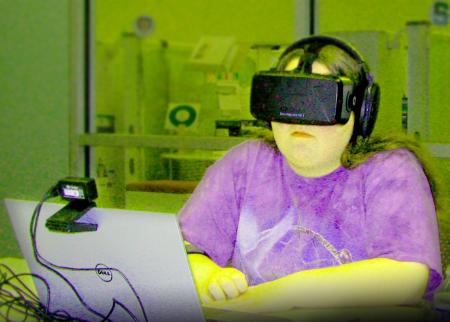
Virtual reality technologies (VRTs) using head-mounted displays (HMDs) could help people with autism develop social skills and confidence according to a researcher from the University of the West of England (UWE Bristol).
Dr. Nigel Newbutt, Associate Head of Media and Digital Cultures at UWE Bristol, said, “With as many as 1 in 68 reported as being diagnosed with an autism spectrum condition, there is the potential for technologies to be used and applied to many affected people. The National Autistic Society, for example, report that around 700,000 people in the UK are affected by an autism condition – a lifelong development disability affecting how a person communicates and relates to other people.”
Dr. Newbutt has investigated how virtual world platforms such as Second Life can help people with autism navigate social situations such as visiting a coffee shop, going to the cinema or even attending a job interview.
A current project he is involved with, funded by the Department for Work and Pensions, is examining how the role of innovative technologies can have a positive impact on the employment prospects of people with autism and other disabilities.
“Findings from a pilot project we undertook earlier this year are very positive,” said Dr. Newbutt. “There is a growing evidence-base that suggests many people on the autism spectrum find interaction with technology easy and, in some cases, more natural than interacting with people. There is some evidence to suggest that games such as Minecraft and virtual worlds such as Second Life (which have been designed for the general public) have great potential to help someone on the spectrum practice and develop social skills; building their confidence in virtual simulations without the fear of real-life consequences.
“The first experiments using VRT technology were held decades ago but the advent of readily available and affordable head-mounted devices we are trialing have helped to enable a greater affordance for the role of technology, with a view to developing new ways of helping people to build confidence around social interaction.
“We tested the reactions of a small group of people diagnosed with an autism spectrum condition to determine their acceptance wearing a HMD, their self-reported immersion, the presence experienced using the technology, and the experience and any anxiety levels associated with the overall experience.
“We wanted to discover how using head-mounted immersive interactive technology might help people with skills development, to overcome their struggle with communication and to act as a toolset they can use to help test social situations.”
The research team looked at willingness of people with autism to wear the device, the extent to which people using the devise experienced a sense of presence and immersion during the ‘experiences’ and also to find out if wearing a device caused anxiety. In each experiment the outcomes were positive and provided some new data to continue the evidence-base in this field.
Dr. Newbutt said: “Initial findings indicate that acceptance of wearing a HMD was positive and negative effects such as dizziness or sickness, sometimes associated with HMD use, was reported as low by the autism group. We worked with a group of adults ranging from 17-52 and so feel the data is representative of a wide age group.”
The next stage (and part of a National Institute of Health grant application) will investigate adapting experiences by developing a targeted intervention program (and specific skills development) and through helping people on the autism spectrum transfer the positive virtual experiences to the real world.
All of the VRT work Dr. Newbutt undertakes involves him working closely with organizations in employability contexts to develop a deeper understanding of the issues facing people in addition to experts who work with people with autism and their families.




